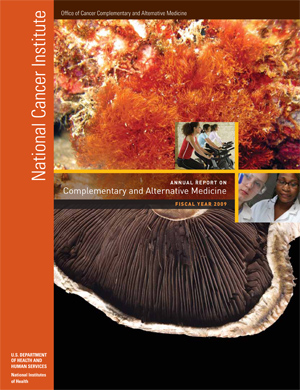Meetings and Events
Spring 2013
Vol. 8, Issue 1
Winter 2013
Vol. 7, Issue 2
Spring 2012
Vol. 7, Issue 1
Spring 2011
Vol. 6, Issue 1
Fall 2011
Vol. 6, Issue 2
Spring 2010
Vol. 5, Issue 1
Fall 2010
Vol. 5, Issue 2
Spring 2009
Vol. 4, Issue 1
Fall 2009
Vol. 4, Issue 2
Spring 2008
Vol. 3, Issue 1
Fall 2008
Vol. 3, Issue 2
Fall 2007
Vol. 2, Issue 2
Winter 2007
Vol. 2, Issue 1
Summer 2006
Vol. 1, Issue 2
News from the Field
What’s the Deal When We Heal? Exploring the
Science of Healing
What does it mean when a patient says they are healed? Ask five different people what it means to be healed and you will receive five different responses. Currently, there is no quantitative method available to assess healing. But a new study* led by Dr. Ann Berger, Chief of the Pain and Palliative Care Service (PPCS) at the Clinical Center, is setting out to change that.
At an event sponsored by the End of Life Palliative Care Special Interest Group (EOL PC SIG) in January, preliminary findings were presented by Dr. Perry Skeath, a PPCS Research Fellow supported by an Intramural Research Training Award (IRTA), from a qualitative study designed to examine healing in cancer patients and survivors and also to help document the results of CAM interventions.
This pilot study is the first step in a larger protocol that will systematically evaluate positive subjective changes in patients. These self-reported changes can be categorized as symptom changes (such as decreased pain or nausea), state changes (such as more happiness or lowered anxiety), or skill changes. Skill changes include the ability to sustain positive subjective experience along with negative subjective experience in the context of negative circumstances; to conserve and efficiently use limited subjective resources (including limited energy and limited coping ability); to make decisions that continue to be reliably satisfying whether healthy, sick, or dying; and to satisfactorily redesign life during or after cancer.

The participants, who were either cancer patients undergoing treatment or cancer survivors, had participated in a week-long retreat at Smith Farm Center for Healing and the Arts. Smith Farm Center, located in Washington, DC, is a nonprofit organization that offers wellness programs for people with cancer and other illnesses. During the retreat, the participants were exposed to various CAM modalities (including yoga, art therapy, and massage) and were encouraged to incorporate the complementary techniques that seemed most helpful into their routine during and after cancer treatment. To be included in the study, participants must have undergone healing experiences, which were defined as positive life-transforming experiences from their illness. These meaningful experiences were self-defined by the participants. The results of this first study suggest it is skill changes that most often lead to the “life-transforming” personal changes reported by these subjects. When patients take skills that increased substantially during cancer and apply them to the whole of their lives, the result can be “life-transforming.”
During his presentation, Dr. Skeath played audio clips that were recorded during participant interviews. These powerful recordings featured the patients talking about ways they dealt with cancer and how it had also impacted the course of their lives. In particular, a few of the patients discussed how difficult it was to get back to the “real-world” and their everyday lives — new ways of living learned by patients during cancer weren’t always compatible with their old ways of living prior to being diagnosed with cancer.
Dr. Skeath commented that one of the surprises emerging from the interviews was “the deep conviction they [the study participants] develop for leading lives that are true to their own nature.” As a result of their illness, a number of the participants actively eliminated aspects of their lives that were not genuine — and this sometimes even included ending close friendships or marriages. Dr. Skeath suggests this may have developed in an automatic way and that some CAM techniques may be involved. He posits that “there is strong reason to believe that many mentally-oriented CAM modalities have enhanced ways to access this automatic-processing aspect of the mind in a very easy, yet constructive way—much more than modern Western psychotherapies. We may be beginning to see what the ‘active ingredients’ of these mentally-oriented CAM modalities are.”
No two patients have identical experiences while battling illnesses, so it is challenging to empirically evaluate patient-reported outcomes. NIH has worked with centers across the country to develop a computerized test to standardize responses from patients, known as the Patient-Reported Outcomes Measurement Information System, or PROMIS. The Cancer PROMIS Supplement (CAPS) was created to measure patient-reported outcomes relevant for cancer populations and studies suggest this may be a useful tool.
The interviews from the healing study were compared with the CAPS survey and it turns out that while some aspects of healing are captured in the CAPS survey, others are not. For example, one of the CAPS questions asked subjects if their experience with their illness had made them more patient. One of the healing study participants commented that she wasn’t sure how to answer that question — following her experience, she had developed more patience for certain things (e.g., traffic), but became less tolerant of other things (e.g., people complaining).
While the details of healing experiences may differ for each individual, this pilot study indicates that examining some of the mechanisms and concepts underlying these experiences may help patients and their healthcare providers guide treatment and possibly improve outcomes. For the next portion of this study, the researchers plan to interview cardiac patients as well as a more diverse sample of cancer patients – not only patients who have already had one or more strong healing experiences.
*Protocol number: 09-CC-0227
NCI’s CAM FY 2009 Annual Report Released

The National Cancer Institute’s Office of Cancer Complementary and Alternative Medicine (OCCAM) is pleased to announce the release of the fifth NCI CAM Annual Report. NCI’s Annual Report on Complementary and Alternative Medicine: Fiscal Year 2009 provides an overview of NCI-supported CAM research and highlights research studies, projects, and grants that are supported by NCI’s extramural and intramural grant funding divisions.
The report includes an in-depth analysis of NCI’s CAM research portfolio, summaries of certain CAM research projects, a list of NCI funded peer-reviewed scientific publications, and details on NCI’s CAM training, conferences, and communications activities.
Highlights of articles in the report include:
- Large Populations and Rigorous Methods Needed for Vitamin D Research
- Pomegranate Studied as Preventative Agent Against Prostate Cancer
- Exercise and Antidepressants May Counteract Stress-induced Tumor Growth
- Cranial Stimulation Tried for Managing Side Effects of Chemotherapy in Breast Cancer
NCI’s Annual Report on Complementary and Alternative Medicine: Fiscal Year 2009 is available for viewing on the OCCAM Website.
Past reports are also available for viewing.
Mobile application makes tracking your dietary supplements a little easier
The NIH Office of Dietary Supplements (ODS) has developed a mobile application that will help individuals track and manage their vitamins, herbs, and other supplements. This application also provides scientifically supported facts about dietary supplements and information about ODS.
Features of the application include the ability to create a personal dietary supplement profile that records the names and amounts of supplements you take, an option to email your supplement list to whomever you like--including your healthcare professionals, and security settings that allow password protection.
More information is available at the ODS website: http://ods.od.nih.gov/about/mobile/aboutmyds.aspx





